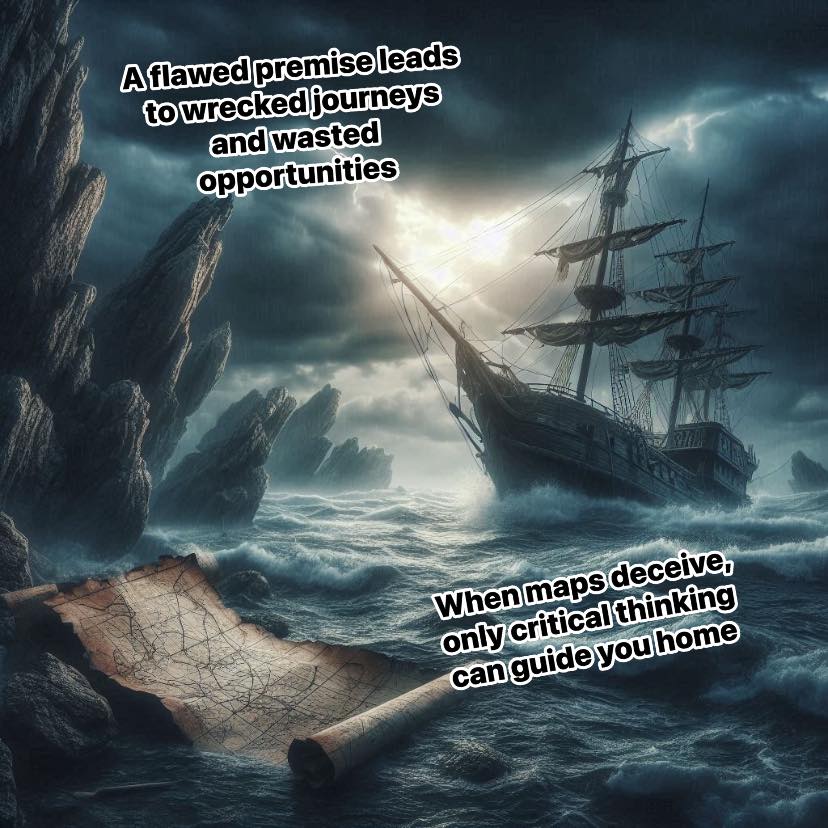
Why the Right Premise Matters
Once upon a time, in a bustling port town named Rivermarch, there lived a merchant named Alden. Known for his ambition and sharp wit, Alden had a reputation for making swift decisions and seizing opportunities others overlooked. His success was undeniable, yet his confidence sometimes teetered on arrogance.
One day, a mysterious traveler arrived at Rivermarch’s docks. Clad in weathered robes and speaking in hushed tones, the traveler told tales of a distant island brimming with treasure—gems, gold, and spices beyond imagination. The traveler claimed to have escaped the island after pirates overran it, leaving its riches untouched for any bold enough to claim them.
Alden’s ears perked up at the tale. “Tell me the way to this island,” he demanded, already envisioning his future wealth. The traveler produced a hand-drawn map, creased and faded, and passed it to Alden. “Beware,” the traveler warned, “the waters are treacherous, and many who seek the island never return.”
But Alden, blinded by the allure of wealth, dismissed the warning. The map seemed legitimate, and his excitement overpowered his usual caution. He invested all his savings in assembling a grand ship and crew, promising riches to those who joined him.
As the voyage began, the crew noticed strange inconsistencies. The winds grew harsher, and the stars did not align with the map’s directions. “Captain,” said Elena, the ship’s navigator, “this map feels wrong. The landmarks don’t match, and the compass points to danger.”
“Nonsense,” Alden replied. “This map is our guide. We press on.”
Days turned into weeks, and provisions began to run low. The waters grew rougher, the skies darker. Doubts spread among the crew, and whispers of mutiny arose. Yet Alden clung to the map, refusing to admit the possibility that it might be flawed.
Finally, the ship ran aground on a jagged reef, far from any treasure-filled island. The vessel was wrecked, and the crew stranded on an uninhabited atoll. Only then did Alden examine the map closely. To his horror, he realized that the map wasn’t a guide to treasure but a crude forgery—its lines drawn carelessly, its landmarks fictional. The premise of his entire voyage had been wrong.
As the crew struggled to survive, Elena approached Alden. “Captain,” she said, “this disaster wasn’t just the map’s fault. You refused to question its validity. You let the promise of treasure blind you to the risks, and now we all suffer.”
Humbled, Alden nodded. “I see now that a decision built on a flawed premise leads only to ruin. I let my desire override my judgment.”
With Elena’s navigation skills and the crew’s ingenuity, they managed to repair a small lifeboat and return to Rivermarch. Alden, forever changed by the ordeal, dedicated his life to teaching others the importance of questioning assumptions. He would say, “A decision’s strength lies in its foundation. If that foundation is weak, the grandest plans will crumble.”
Alden’s realization echoes a deeper truth. Throughout history, prophets and messengers brought wisdom and guidance, yet they were often rejected by their communities. Why? Because people clung to their biases, dismissing new truths that challenged their flawed premises. Instead of critically analyzing the messages, they succumbed to confirmation bias, refusing to consider anything that opposed their preexisting beliefs. Tragically, this same dynamic persists today, as different religious sects reject one another’s interpretations without objective analysis. Just as Alden’s blind trust in a faulty map led to disaster, rejecting truth based on erroneous assumptions only perpetuates division and misguidance.
The same mistake occurs in the political arena. Politicians often base decisions on faulty premises, whether driven by incomplete data, ideological biases, or populist pressures. They implement policies without fully considering their long-term consequences or questioning the validity of their assumptions. History is replete with examples of wars waged, economies destabilized, and social fractures deepened because leaders acted on flawed premises. Had they paused to critically analyze their foundations, countless catastrophes could have been avoided, and societies might have thrived instead of suffered.
Moral of the Story:
A decision is only as sound as the premise upon which it is built. To avoid regret and failure, it is essential to question and validate assumptions before acting. A flawed premise may lead to disaster, while a solid one paves the way for success—and the acceptance of truths that can transform lives.

